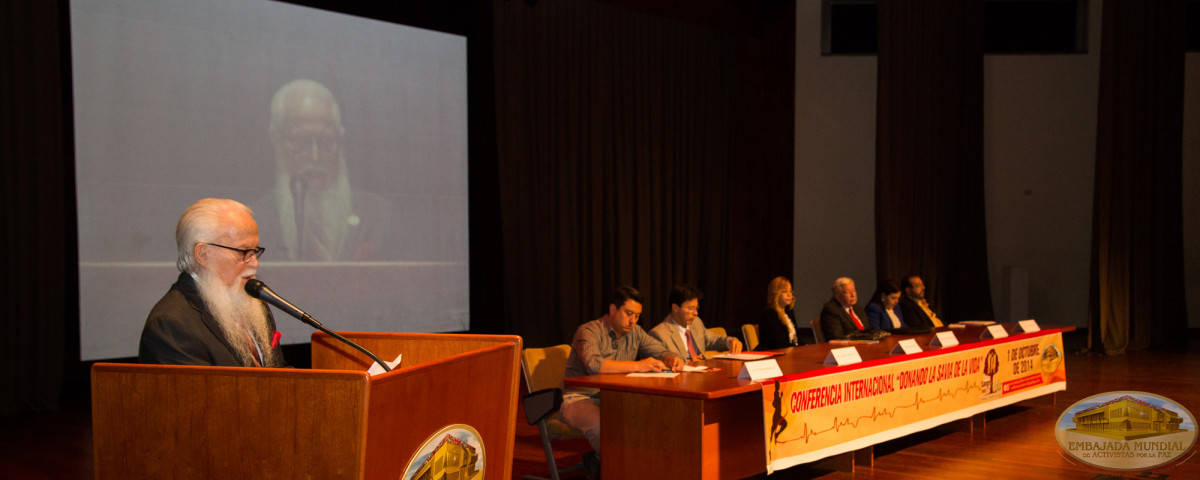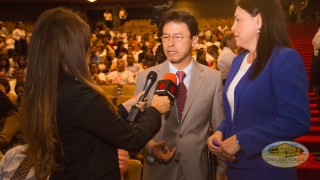Presentation of the Communicational Educational Program of the campaign “Life is in the Blood”
As part of the opening activities of the 4th International Blood Drive Marathon, the International Conference "Donating the Sap of Life" was held at the Aula Magna of the Central University of Venezuela, which aims to present to the world the Communicational Educational Program for the Formation of a Voluntary and Habitual Culture of Safe Blood Donation, a vision of the Global Ambassador of Peace Dr. William Soto, developed by the Project Development Council of the Global Embassy of Activists for Peace.
Representatives of blood banks, the Red Cross and other institutions, professors and students of the University, volunteers from community organizations and activists for peace in Venezuela, gathered that day to hear the presentation of the Communicational Educational Program and a bill for the voluntary and habitual safe blood donation, two instruments that the Global Embassy of Activists for Peace are activating in several countries, making Venezuela a platform for its activation.
Dr. William Soto, Global Ambassador of Peace, began his speech by citing the Universal Declaration of Human Rights, Article 25, paragraph 1, which states that everyone has the right to health and wellness, medical assistance and necessary social services, for themselves and for their family:
“At the Global Embassy of Activists for Peace we consider that it is necessary that each citizen has the opportunity to obtain safe and free blood when needed to enjoy the right to health and medical assistance.”
To do this, Dr. Soto said that a culture of voluntary and habitual donation should be the cornerstone of every National Blood System, whereby the Global Embassy of Activists for Peace is working in Latin America in promoting a bill whose objective is: "To declare the promotion of a safe and habitual culture of voluntary blood donation a national interest.” He said that this culture is created through educational programs that "increase awareness about the value of life and solidarity towards others".
"Therefore, parallel to the bill, as Global Ambassador of Peace, I propose an educational program to instill public conscience in people of different ages; to see blood donation as more than a social responsibility, understand that it is an act of love and generosity, through which, as human beings, we can give others the greatest gift: LIFE.”
A large group of specialists in the field of healthcare, law, education and communications accompanied Dr. William Soto to explain the objectives, purposes and scope of this educational program.
The Venezuelan diplomat and expert in international relations, Dr. Julio César Pineda, said that there is an international system which preserves the right to health in all instances, and through this project, human rights and the constitutions of Latin America and Venezuela are being fulfilled.
Moreover, he pointed out that he was a diplomat of Venezuela in Geneva for many years, and was visibly enthusiastic to witness the work of the Global Embassy of Activists for Peace on the issue of blood donation. He said to Dr. William Soto:
"In Geneva, I met both the Red Cross, which has causes like these in blood donation, but also the International Federation of Blood Donors. It was established in 1955, its headquarters is in Monaco, and if you allow me I will send a formal, diplomatic letter, because there is a global recognition that is given to institutions who work in this field; to recommend the Global Embassy of Activists for Peace be considered for one of the awards, for this beautiful work in Venezuela and other places in the world."
The cardiologist and advisor of the Project Development Council of the Embassy, Dr. Aurys de Freitas, spoke about the social responsibility of medical professionals on the need for a culture of voluntary and habitual safe blood donation. With her experience in the field of healthcare, she stressed the importance of the campaign "Life is in the Blood" because genuinely safe blood is unpaid for, has less risks of contamination and infection, as it is carefully studied and certified. She expressed the responsiveness that she has had as a doctor toward these campaigns, thanks to the vision of the Global Ambassador, Dr. William Soto:
"This is why I think that this act is extraordinary, valuable to the human family and even to ourselves, because statistics also indicate that 20% of the population, at any given moment, may need blood."
Dr. Camilo Montoya, Project Development Council Director of the Global Embassy of Activists for Peace, made the presentation of the bill for a culture of voluntary and habitual safe blood donation, noting the international legal basis, because the right to health and life is no longer just a human right but a fundamental right, essential to improve the quality of life of human beings.
He also explained that the emphasis made by the Global Ambassador of Peace, Dr. William Soto, on the importance of education, is reflected and translated in the campaign "Life is in the Blood", because we must educate to instill the love for thy neighbor, love for our fellow man, love of life, and love for health:
"Finally, a question that every donor should ask themselves, the question is: who will benefit from the blood that we are donating today? An adult, maybe, a child, a lady, a man? I do not know who it will benefit (...) who will it be, to whom will I be giving this portion of life to? All I know is that I don’t know who it will be. But one thing is clear: that this human being who I will be donating my life to, although I do not know him, I love him, I love him infinitely..."
Then, the legal adviser of the Global Embassy of Activists for Peace in Venezuela, Dr. Eloy Durand, explained the constitutional mechanisms to be activated in Venezuela, to introduce the bill proposed by Dr. William Soto before the National Assembly of Venezuela, claiming the support and success that will be obtained for this initiative, among every citizen of this country.
The presentation of Communicational Educational Program for the Formation of a Voluntary and Habitual Culture of Safe Blood Donation, developed by the Global Embassy of Activists for Peace, was in charge of the Coordinator in Venezuela, Ruth Florez de Bermudez, who explained the objectives, philosophical and theoretical foundations of communicational educational program, noting that it addresses four areas of society: family, community, education and businesses; and said that if we begin to form at an early age a culture of voluntary and habitual blood donation, based on principles and altruistic values, people are going to apply these principles in all areas of their lives, learning that first they have to be take care of themselves to be able to donate blood:
"...And when someone comes to our kids, our youth, offering drugs, they will say: "No. I take care of my body. I take care of my health because I am or I will be a volunteer donor" (...) Grasp the magnitude this project has."
To end this event, the Global Ambassador, Dr. William Soto, led an emotional ceremony with everyone in the Aula Magna of the Central University of Venezuela, "Let's take a few minutes to make a commitment for life, for the life of our neighbor. Repeat these words: "Today, October 1, 2014, we are committed to creating a culture of voluntary and habitual safe blood donation." And now we are committed."

